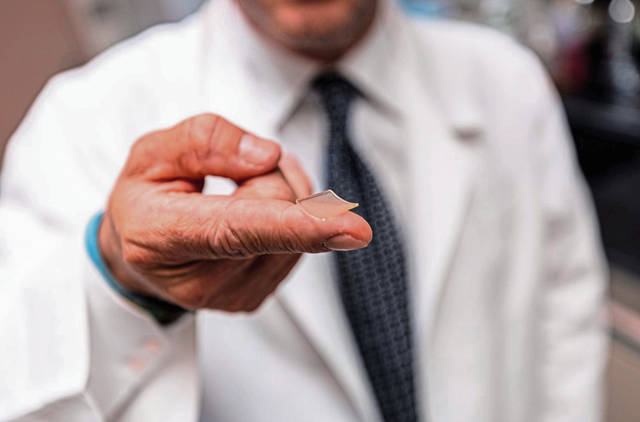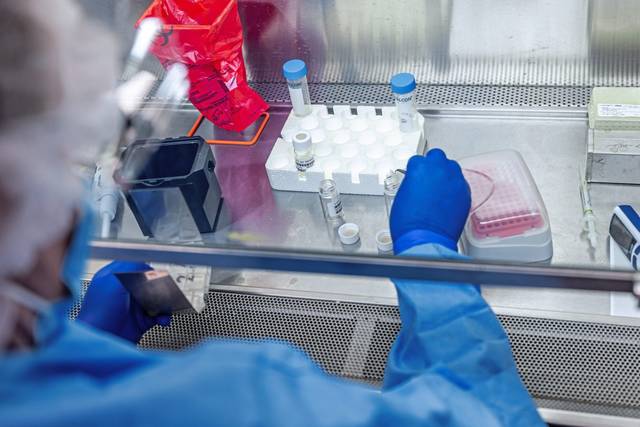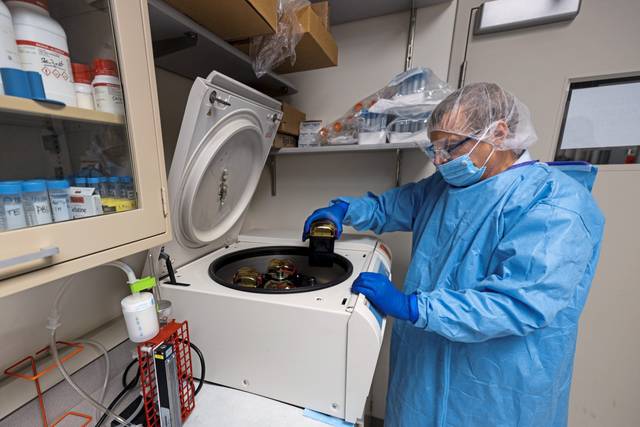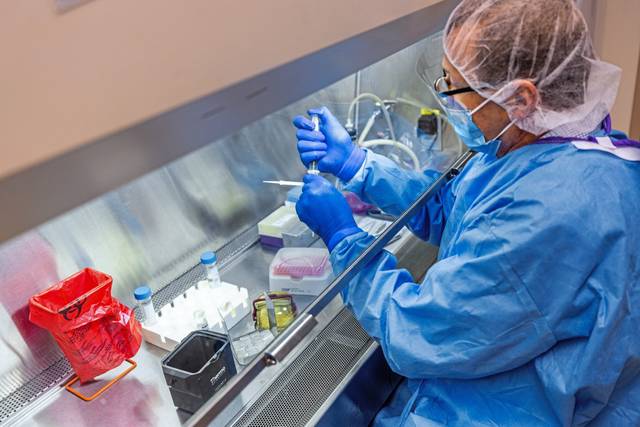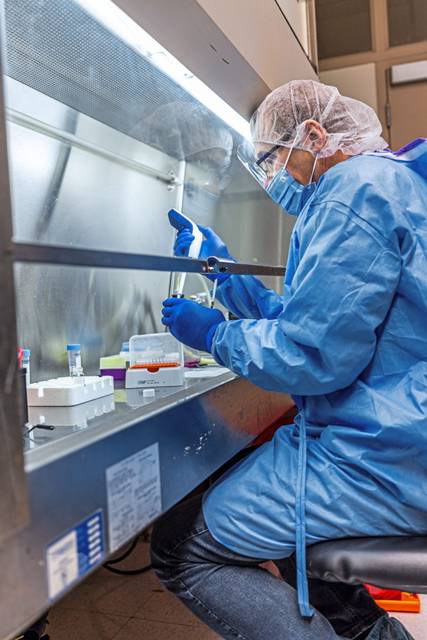Pittsburgh scientists develop possible coronavirus vaccine, hope FDA can fast-track it
A potential vaccine against the novel coronavirus causing the covid-19 outbreak has been created in a University of Pittsburgh lab.
Researchers say the first phase of human clinical trials — which would include healthy volunteers in the Pittsburgh area — could start in the coming months.
Scientists at the University of Pittsburgh School of Medicine announced Thursday that the vaccine, when tested in mice, produces antibodies specific to the coronavirus SARS-CoV-2 that could be enough to fight off the virus. Testing the vaccine in mice doesn’t guarantee efficacy in humans.
“We’re ready to initiate clinical trials as soon as we are able to meet the necessary requirements,” Dr. Louis Falo, professor and chair of dermatology at Pitt’s School of Medicine and UPMC, said during a press briefing.
In making the announcement, Falo invoked Pitt’s own Jonas Salk — the medical pioneer whose team developed the world’s first effective polio vaccine in 1955.
The vaccine findings are part of the first peer-reviewed study describing a potential vaccine, according to the Pitt researchers. The paper appeared Thursday in EBioMedicine, which is published by The Lancet, one of the oldest peer-reviewed medical journals.
While human testing typically requires at least a year, Falo said Pitt is working with federal agencies to speed the process.
“This particular situation is different from anything we’ve ever seen, so we don’t know how long the clinical development process will take. Recently announced revisions to the normal processes suggest we may be able to advance this faster,” said Falo, who is senior co-author of the research.
The researchers are applying for approval from the U.S. Food and Drug Administration.
Developing the vaccine
Public health experts around the world agree that there could be another outbreak of the novel coronavirus, even after a period of fewer cases and deaths from complications from covid-19. Dr. Anthony Fauci, head of the National Institute of Allergy and Infectious Diseases and a member of the White House coronavirus task force, reinforced that assessment during a White House press briefing Wednesday.
“The ultimate solution to a virus that might keep coming back would be a vaccine,” Fauci said, noting that the soonest a vaccine is likely to be ready is in about 12 to 18 months.
Pitt scientists were able to build on previous research related to two viruses — SARS-CoV, observed in 2003, and MERS-CoV, observed in 2014 — that are related to SARS-CoV-2, the new coronavirus that causes covid-19, as they were figuring out how do develop the vaccine.
“These two viruses, which are closely related to SARS-CoV-2, teach us that a particular protein, called a spike protein, is important for inducing immunity against the virus,” said co-senior author Dr. Andrea Gambotto, associate professor of surgery at the Pitt School of Medicine. “We knew exactly where to fight this new virus.”
Pitt isn’t the only institution participating in the global race to develop a vaccine, which Fauci called “the ultimate game-changer.”
At least 50 other potential vaccine candidates are in development worldwide, and two candidates — one developed by researchers in Beijing, the other by the Cambridge, Mass.-based biotechnology company Moderna and the U.S. National Institutes of Health — have proceeded to clinical trials, according to a tally kept by the World Health Organization.
Moderna and the U.S. National Institutes of Health started clinical trial testing in humans of the first experimental vaccine for the new coronavirus March 16 in Seattle.
That vaccine uses genetic material that prompts the body’s immune system to start preparing to fight the virus.
PittCoVacc, short for Pittsburgh Coronavirus Vaccine, works the same way as the current flu vaccine: lab-made pieces of the viral protein, referred to as antigens, are introduced to prompt the body to start building immunity.
Mice that received PittCoVacc started generating a surge of antibodies against SARS-CoV-2 within two weeks.
“This vaccine is designed to be safe, in part because it delivers very low doses of antigen,” Falo said. “Much lower doses than the traditional flu vaccine. Secondly, it delivers that antigen to a very confined space within the skin, so that it’s very unlikely that we would see any type of systemic responses that have been seen with some patients in the flu vaccine.”
Administering the vaccine
In order to increase potency, the vaccine would be administered using a novel approach called a microneedle array.
The microneedle array, which looks like a patch about the size of a fingertip, contains 400 tiny needles made out of sugar and pieces of the spike protein.
The patch goes on like a Band-Aid. The needles dissolve into the skin, where the immune reaction is strongest.
“We developed this to build on the original scratch method used to deliver the smallpox vaccine to the skin, but as a high-tech version that is more efficient and reproducible patient to patient,” Falo said. “And it’s actually pretty painless — it feels kind of like Velcro.”
The vaccine is expected to be effective across age groups. Similar to the flu vaccine, elderly patients may require a slightly higher dose.
The process for making the vaccine does not require significantly complex or expensive equipment, which makes it very scalable, Falo said.
“At present time in our lab, one person with the set of molds and the centrifuge can make hundreds of microneedle arrays in a single day,” he said.
The vaccine does not need to be kept frozen or refrigerated, which could reduce shipping costs and help with distributing the vaccine.
“When the vaccine is actually ready for widespread deployment, it would most likely be ready broadly so that we would not have to ration the vaccine,” Falo said. “I would expect that the manufacturing and scale-up would occur during the testing process, so that plenty of vaccine would be available if it proved to be effective.”
Jamie Martines is a Tribune-Review staff writer. You can contact Jamie by email at jmartines@triblive.com or via Twitter .
Remove the ads from your TribLIVE reading experience but still support the journalists who create the content with TribLIVE Ad-Free.



